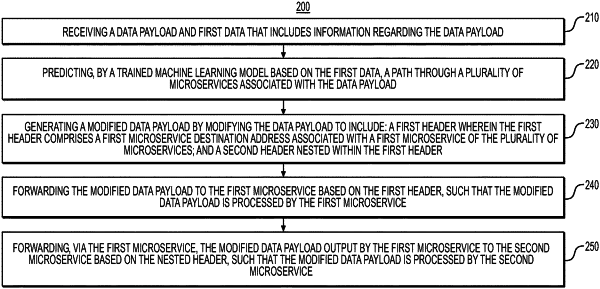| CPC G06F 9/54 (2013.01) [H04L 9/0838 (2013.01)] | 19 Claims |

|
1. A computer-implemented method for routing data payloads through a plurality of microservices, the method comprising:
receiving, by one or more processors via an orchestrator service, a data payload and first data that includes information regarding the data payload;
determining, by one or more processors via the orchestrator service, that one or more microservices of a plurality of microservices are required to process the data payload based on the information regarding the data payload and one or more tasks associated with the data payload that are performed by the one or more microservices of the plurality of microservices;
predicting, by a trained machine learning model executed by the one or more processors and based on the first data, a path through the one or more microservices associated with the data payload, wherein the trained machine learning model is trained based on: (i) second data that includes one or more prior data payloads and prior feedback data as test data, and (ii) third data that includes one or more prior microservices corresponding to the one or more prior data payloads, to learn associations between the test data and the corresponding prior feedback data for each of the one or more prior data payloads, such that the trained machine learning model is configured to determine a path through the one or more microservices associated with the data payload in response to input of the first data and the data payload;
generating a modified data payload by modifying, by the one or more processors via the orchestrator service, the data payload to include:
a first header, wherein the first header comprises a first microservice destination address associated with a first microservice of the one or more microservices; and
a second header nested within the first header, wherein the second header comprises a second microservice destination address associated with a second microservice of the one or more microservices;
forwarding, by the one or more processors via the orchestrator service, the modified data payload to the first microservice based on the first header, such that the modified data payload is processed by the first microservice; and
forwarding, by the one or more processors via the first microservice, the modified data payload output by the first microservice to the second microservice based on the second header, such that the modified data payload is processed by the second microservice.
|